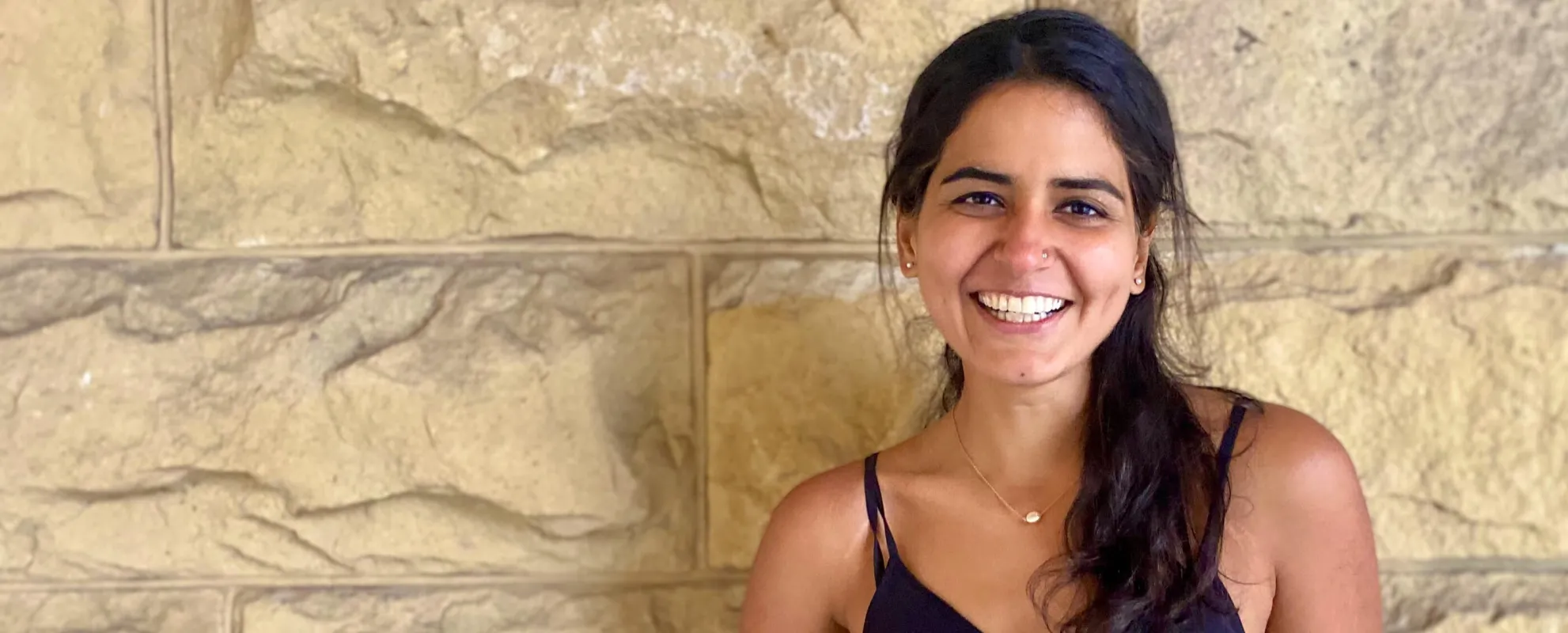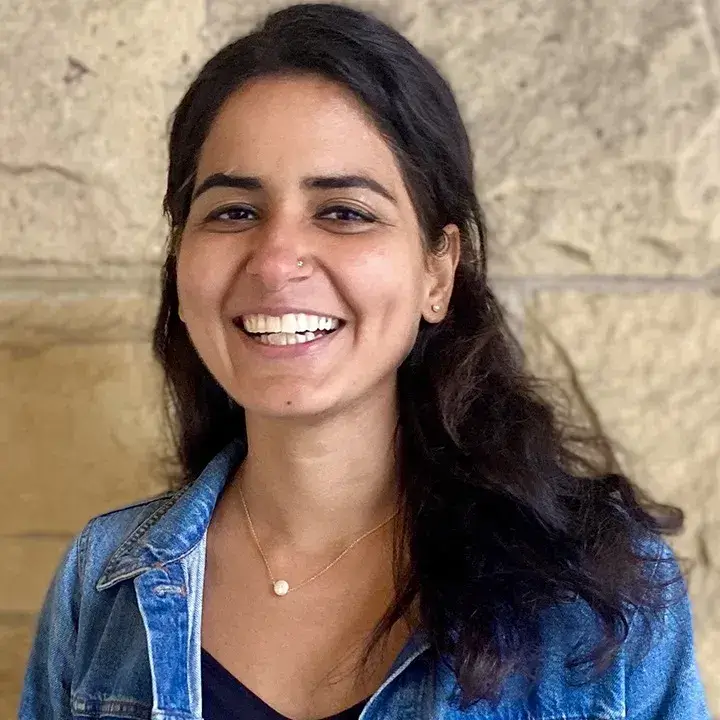As a kid, Areeba Kamal was aware of the sacrifices her parents were making to pay for her education, but the issue gained sharp clarity this past January when she flew home to Karachi, Pakistan, to attend her mother’s funeral. There, she uncovered notebook after notebook filled with budgets.
“My dad had written down exactly how much money he had spent on bread, on fuel, down to the rupee,” Kamal says. “This is how he budgeted — every single day for years and years — because we had very little money and we had to make ends meet.”
In spite of her background, Kamal dreamed of coming to the U.S. for higher education. After graduating from high school, she applied to dozens of American colleges in the hopes of securing enough financial aid to get the first four-year college diploma in her family. When one of the colleges came through with a full scholarship, Kamal left Pakistan for the first time at age 20 to get an undergraduate degree in computer science. Now, she’s in her second year at Stanford GSB and recently accepted a full-time position in the heart of Silicon Valley as a product manager at Apple. Kamal hopes to explore the role of technology in building greater equity and access across the world, all while trying to reconcile her humble roots with her privilege as a Stanford MBA.
You’ve described your mom as your hero. What are your earliest memories of her?
In preschool, I remember being confused why most kids’ moms came to pick them up after school, while mine was at the office. I remember spending weekends going to the office with my mom, and doing my homework in a corner while she paced across a conference room, getting her words just right for the next client meeting.
She worked her way up from a two-year associate’s degree to become one of the senior-most female executives in advertising and marketing in Pakistan, all while educating and guarding two daughters in a deeply patriarchal society. She was also the primary breadwinner of our family, funneling every dime she earned into my sister’s and my education and telling us to use our words and our voice every chance we got in a society where women are frequently belittled and silenced.
How did your parents view the importance of education?
My mom and dad had very little money, and both of them started working full-time in their late teens to support their respective families. It was never easy for them to make rent or put food on the table. But my mom was determined that my sister and I would attend the best schools in the city, even if she could barely afford them. Instead of choosing an underfunded public school with questionable teaching standards, she found a way to put my sister and me through private schools where we could sit for the internationally credentialed examinations. But her health suffered as she worked day and night, weekdays and weekends, pouring all her income into our education instead of her own medical care.
By the time I graduated from high school, my mother was suffering from acute arthritis, diabetes, and hypertension. I was valedictorian, and I remember giving the commencement speech while she waited in the car because she couldn’t climb the stairs to the auditorium. I got my diploma and accolades, then ran to the parking lot so we could go over my trophies together.
If my mother hadn’t fought to put my sister and me through expensive private schools, if she hadn’t sacrificed her youth and health for my future, I could never have gone to college abroad. I owe my education, my career, my entire life to her vision and foresight.
Were you aware of these sacrifices while you were growing up?
Yes. When I went back home for my mother’s funeral, my sister and I found diary upon diary where my dad had written down exactly how much money he had spent on bread, on fuel, down to the rupee: ten rupees for bread, a hundred rupees for fuel, etc. This is how he budgeted — every single day for years and years — because we had very little money and we had to make ends meet.
By the time I was in my last year of high school, it was almost impossible for my parents to continue paying for my education. I was fortunate enough to have a great high school dean, who allowed me to work part time after school to make up for a shortfall in tuition payments. I would attend class during the day, then help with administrative errands in the evenings. After graduating high school, I took up a job as a school administrator during my gap year, making $400 a month, almost all of which went toward paying for my SATs and college application fees.
Why did you want to come to the U.S. for college?
As a woman, I wanted to have more agency over my life. In some ways, life back in Pakistan is similar to life here. When I go home, I spend a lot of time discussing politics, movies, and literature while drinking copious amounts of tea and coffee with friends — pretty much what I do on weekends at Stanford.
At the same time, life back home is deeply limiting for women. Whether it’s driving by myself at night, having agency over what I wear and do with my time, determining exactly when I get married or have kids — I’d be unable to make basic choices like that for myself.
In my last year of high school, I initially figured I’d go to a Pakistani college with some help from local scholarships. My high school dean stopped me and said, “I think there’s more for you.” He offered me a job as a school administrator and helped me apply to schools. I ended up applying to 35 U.S. colleges. Twenty-nine rejected me, five waitlisted me, and one accepted me with a full ride. I left Pakistan for the first time at age 20 with little more than a thousand dollars I’d saved over the course of my gap year and an acceptance letter from Mount Holyoke College.
Was coming to the States a hard transition?
In some ways, it all felt like a fairytale. I had worked so hard, dreamt so long, and I was overwhelmed by the possibilities and novelties before me. I remember seeing snow for the first time, witnessing fall colors, and feeling free and powerful. But I also remember feeling miserable. It was confusing to go from a city of 20 million people to a college town of 17,000, and lonely to realize that everyone I knew was on the other side of the world. I would call up my sister and ask her to walk through the house, showing me the walls so I could be sure my home was still intact. I often felt small and far away.
Was it an easy choice to apply to Stanford GSB and then attend?
I applied to six graduate schools, and when the GSB called to tell me I was accepted, I remember jumping up and down with excitement. That’s not typical behavior from me. The sheer unbridled joy was a good indication I should come here. I felt excited knowing that the GSB is a place where students get a chance to build on their strengths and realize their most enthralling career ambitions.
At the school, you’re the co-leader of the First-Generation/Low-Income Club. What’s the club for and why are you involved?
The First-Generation/Low-Income Club aims to create a community among students who share the invisible first-generation/low-income identity. It can feel isolating to be a FLI student at Stanford GSB, especially for those of us who are the first in our family to attend college, let alone graduate school, or are sending money back home while accumulating debt and struggling with expenses. The club reaches out to FLI students, helping them find each other, facilitating connections through sharing our own backgrounds, and acknowledging socio-economic and class diversity on campus. We also try to connect students with financial resources, whether it’s an emergency fund, cheaper rent options, or quarterly food pantries. This past quarter, we began organizing FLI families — groups of five to six MBAs who come from modest backgrounds and offer each other camaraderie and support.
You plan to work in the tech sector after Stanford GSB. How does your background inform your work?
Like my peers at the GSB, I grew up watching technology disrupt every aspect of life and benefiting from the opportunities it created. My journey from Karachi to Palo Alto would have been much harder without virtual college tours, WhatsApp calls across the world, and a technical undergraduate degree. As a woman from a low-income family and developing country, I get excited thinking about how the tech products that permeate our daily lives can scale more effectively across differences in demographics, geographies, internet connectivity standards, physical ability, income levels, etc. I want to spend my post-GSB career making technology products scalable and accessible, especially for historically disenfranchised groups.
I know your mom died in January of this year. How has that affected your outlook on life at and after the GSB?
My mom had been unwell for a long time. But I had no idea how debilitating it would be when she died, how it would feel like losing a limb or forgoing a part of my brain. There are days when I second-guess every decision I’ve made, when I recreate the past in my head and imagine what it would have been like if I never left Pakistan, so I could have stayed close to her for longer.
That said, my mother always saw my journey as an extension of her own legacy to do difficult but meaningful things, to make the world a better, more creative, more equitable place by virtue of her life’s work. She taught me how to persevere in the face of every challenge, and to use my voice every chance I get. So I will keep on channeling the resilience, power, and hope she embodied. I am, after all, my mother’s daughter.
Photos by Jenny Zhou


